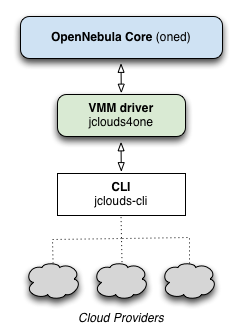On Nov 15th, 2013 Terradue announced the new jclouds4one OpenNebula add-on. Co-funded by the European Space Agency, it is released in the frame of Terradue’s “OpenNebula Add-ons” campaign.
This jclouds4one driver implements new capacities for hybrid Cloud Computing, expanding OpenNebula’s support for Cloud Bursting, with the ability to work with a variety of up to 30 cloud providers & cloud software stacks, including Amazon, Azure, GoGrid, Ninefold, OpenStack, Rackspace, and vCloud.
The driver requires a command line interface, built on top of jclouds, like the jclouds-cli available on GitHub (https://github.com/jclouds/jclouds-cli). The driver interacts from one side with the OpenNebula Core, and from the other side with the jclouds CLI, that behaves as an interface upon a series of Cloud Providers.
To use the driver from your OpenNebula platform, you simply need the following:
- Have a working account for a provider included in the jclouds library, and signup for a compute service (like EC2 in the case of AWS)
- Download and unpack the jclouds-cli command line client software, and verify everything works with your credentials
- Plug it and configure it into the OpenNebula front-end, by following an RPM-based installation or by a simple manual installation (see Documentation)
- Create an OpenNebula template, inserting the relevant parameters like location, group, hardware type and so on (see Documentation)
Here is an example of a jclouds hybrid template:
NAME="jclouds"
CONTEXT=[
FILES="file1 file2"
]
JCLOUDS=[
GROUP="default",
HARDWAREID="t1.micro",
LOCATIONID="us-east-1d"
]
The CONTEXT keyword triggers the creation of a contextualization tar file, that enables a remote contextualization (i.e. the contextualization is made available on the main Cloud Controller and served via an HTTP server like Apache).
The following figure shows the jclouds4one driver in action, using the AWS EC2 provider through the jclouds library. The deployment ID gives information about the instance identifier and the public address assigned. Other information such as the private address are available under the tab Template.
Relevant Links
jclouds4one in the OpenNebula Add-ons catalog: https://opennebula.io/addons:catalog
jclouds4one Github repository: https://github.com/OpenNebula/addon-jclouds4one
jclouds4one Documentation: https://github.com/OpenNebula/addon-jclouds4one/blob/master/README.md





0 Comments